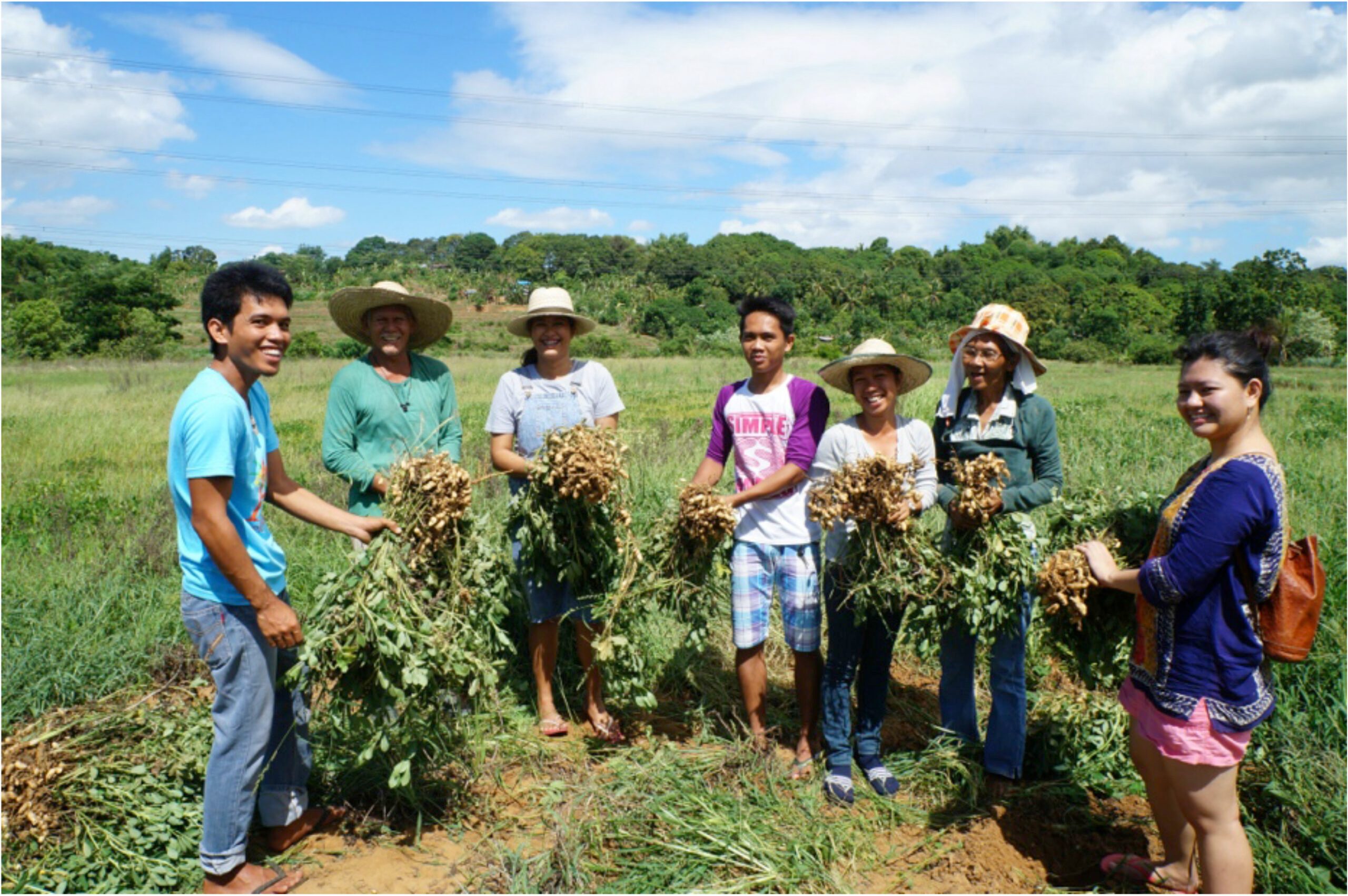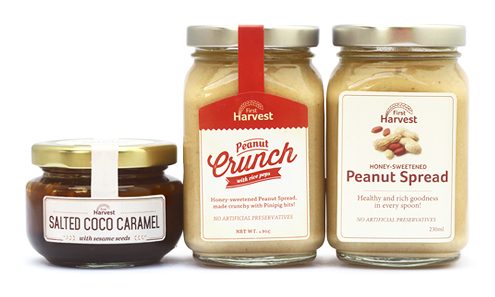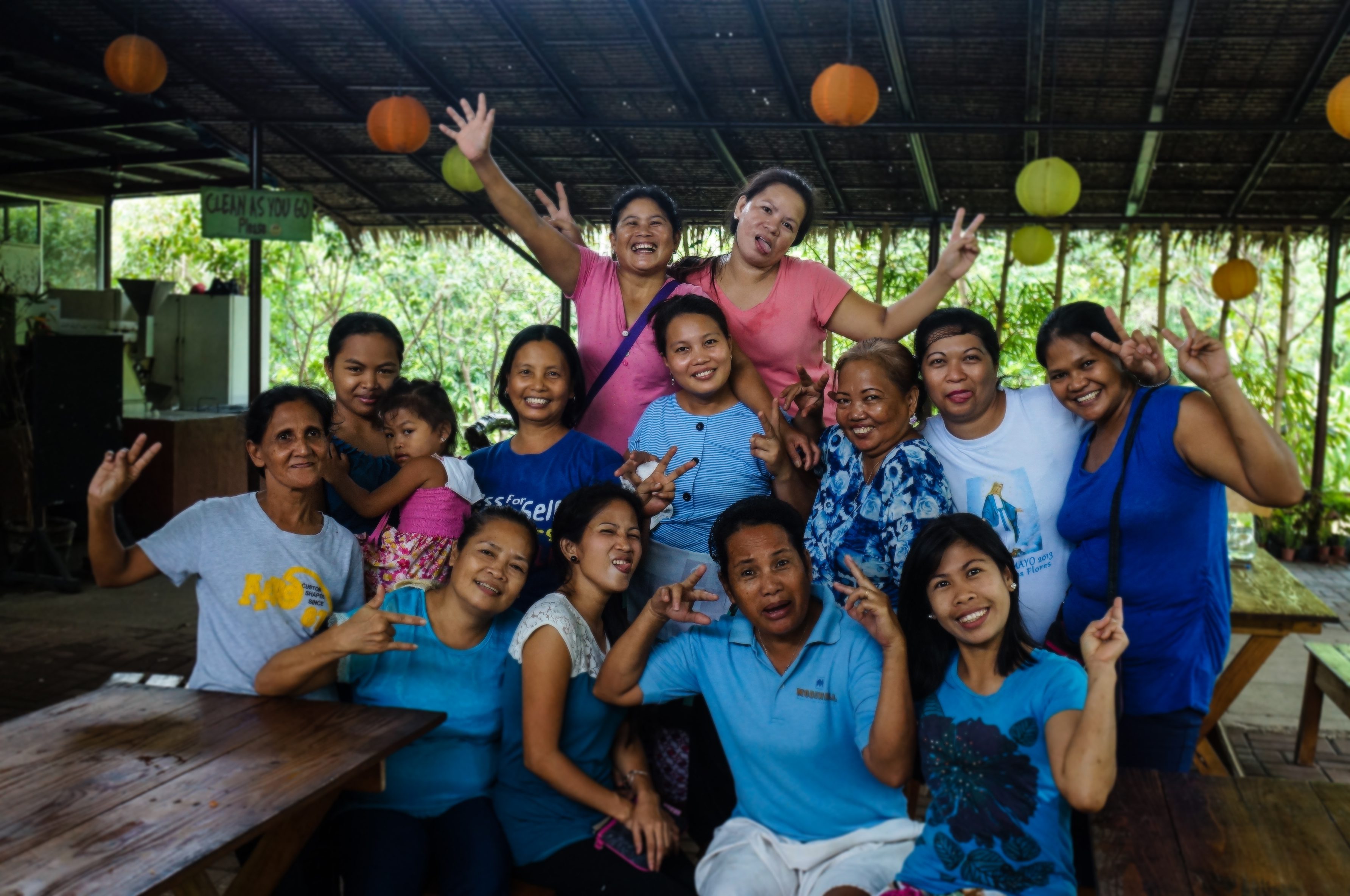SUMMARY
This is AI generated summarization, which may have errors. For context, always refer to the full article.

The road out of poverty begins in a place with a name more appropriate for magic realism plotlines than a patch of arable land. It begins where the country’s great cities, financial hubs, and centers of commerce end. It begins with soil and seed, a pair of willing hands, and a community that will help buoy a cash-short enterprise in its early days.
For some Filipino farmers, the long road begins north of Metro Manila, at the Gawad Kalinga (GK) Enchanted Farm in Angat, Bulacan. Their path converges with that of young social entrepreneurs who create consumer products by processing the crops.
Among those, peanut serves as the main ingredient of startup First Harvest’s spreads. (READ: People over profit)
Also known as groundnut, it can grow year-round if given adequate supply of water and soil nutrients. Despite this, the Bureau of Agricultural Research found its production in the Philippines “low and erratic”.
To help boost planting and ensure excellent yield, First Harvest collaborates with peanut farmers in employing good practices.
“We work directly with them, help them secure planting materials, and commit to purchas[ing] their produce so that we minimize their losses from spoilage,” shared cofounder Catherine Patacsil.
Opportunities further extend to the farmers’ children, as some of them are working as on-the-job trainees in the two-year-old food business. A scholarship fund has also been set up to develop confidence and competence among the members of the next generation.
Yet, First Harvest’s approach will not be complete without the participation of mothers in the community, who are at the core of the company’s daily operations.
“The mothers who we work with have that inexhaustible drive to do well,” said Patacsil of their partners in crafting homemade peanut spreads.
The notion that the poor are lazy and cause themselves to fail needs rethinking.
Having worked with the disadvantaged, Patacsil “realized how much they dream not only for themselves, but for their whole family and community. They work with diligence, and commit to finish the work they do because they know their work impacts the whole community.”

GK’s help
Meshing impact with profit-making, the way First Harvest owners and kindred spirits — such as the people behind Theo & Philo and Hot Papa — live it in the farm, is not an entirely novel venture.
If anything, it puts a twist to an old saying, so that now it takes a village to transform an idea into reality and to raise a child by way of enabling the child’s family.
GK Enchanted Farm‘s resources and network have been instrumental in establishing First Harvest.
Foreign interns, for example, were invited to the farm to aid in marketing, operations, and product development. The launch of the brand’s Salted Coco Caramel was spearheaded by Justine Lerche, a French intern.
This group works closely with the community partners to ensure the outputs are meeting standards of quality.
It is First Harvest’s aim to ramp up sales and distribution of their goods, diligently bringing them to bazaars and markets in upscale and middle-class neighborhoods in Metro Manila.
In turn, they hope to enlarge demand for agricultural products. Investment in agro-processing and export are their long-term strategies to make this happen.

Empowering farmers
Born out of the simple desire to be part of the solution, the social enterprise is looking at lessening importation of peanuts and other crops.
Down the road, First Harvest seeks to do this by expanding on several farms in the country.
Attending the International Developmental Social Work Conference, Patacsil heard delegates from countries like Hong Kong and Singapore pertain to food’s increasing prices at home, “thereby causing rent to be expensive and in turn jacking up the prices of restaurant food.”
“Yet, here in the Philippines, we have managed to take this valuable resource for granted and have abandoned our land,” she related.
Farmers as primary sector workers are still being left behind in the overall growth of the country. Land productivity, including adoption of good agricultural practices and technological innovations, remains a challenge.
“It is the farmers who feed the population, and yet, they are the ones we leave hungry,” said Patacsil. (READ: Goodbye Gutom, ending hunger through Bayanihan)
First Harvest constantly enhances the business model to generate revenue that could cover costs as well as causes. By doing so, it sets itself on the task of empowering farmers, mothers, and children on the farm.
Patacsil added: “We make sure that more than just [accepting] job opportunities, our partners can someday take the lead and make decisions in the business.”
First Harvest found a common road with farmers, mothers, and their children in their quest for sustainability.
Theirs is a story that can be replicated across the islands, by individuals and groups with an entrepreneurial streak and a real intent to create impact where it is needed the most. – Rappler.com
Shadz Loresco is a freelance business writer for both online and print. Follow her on Twitter: @shadzloresco.
Add a comment
How does this make you feel?
There are no comments yet. Add your comment to start the conversation.